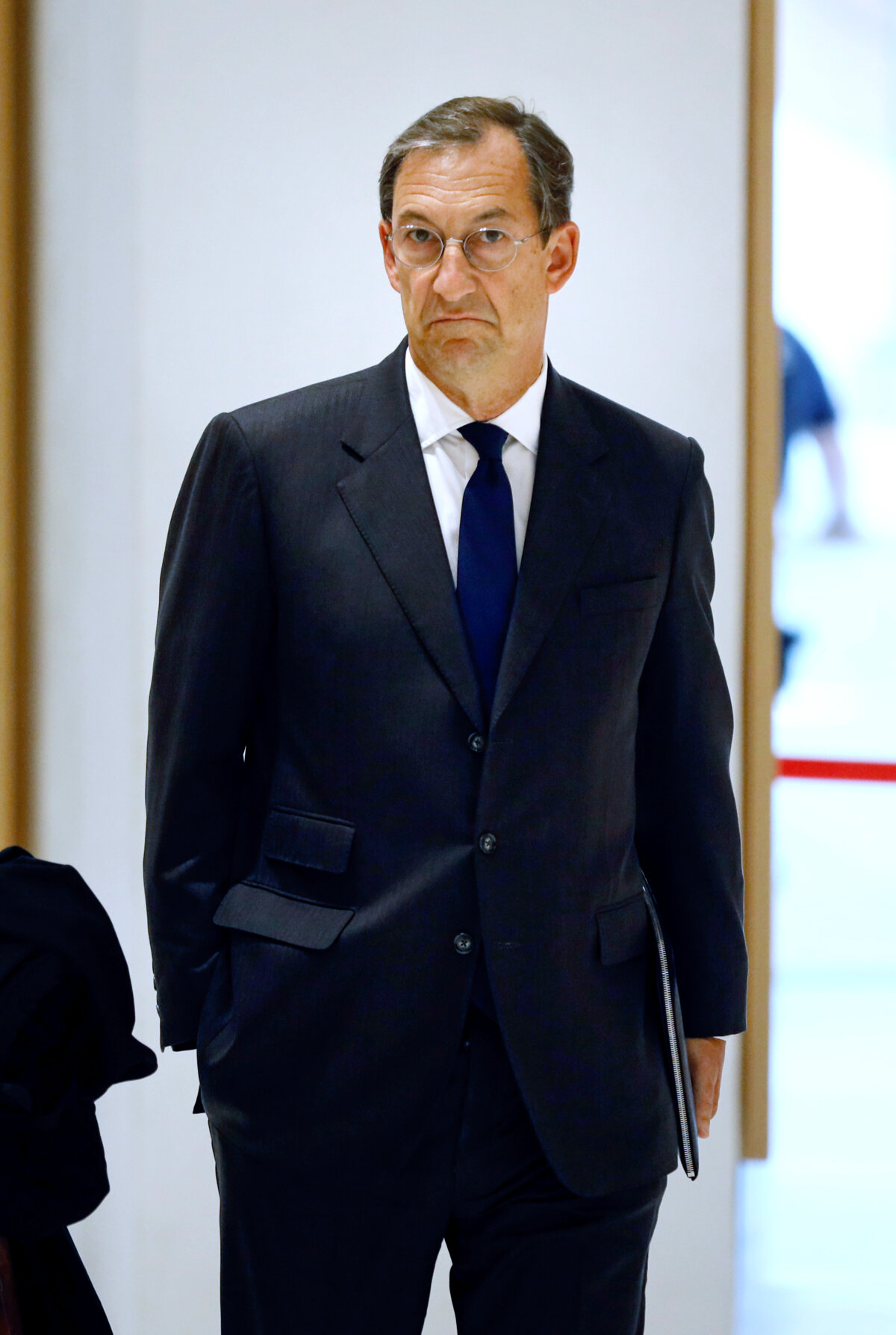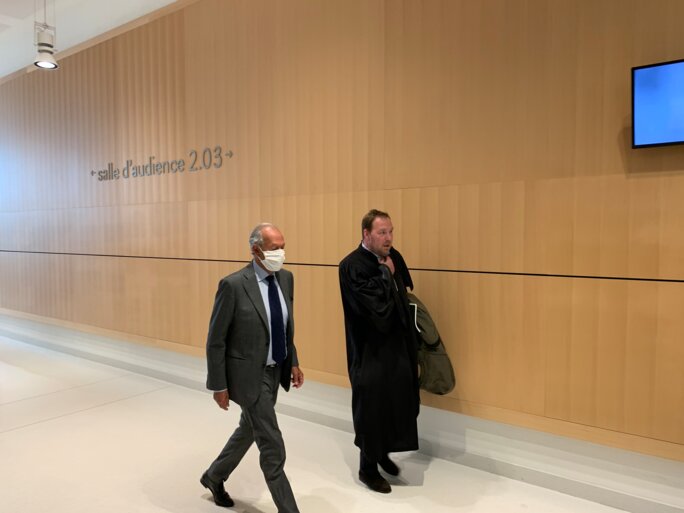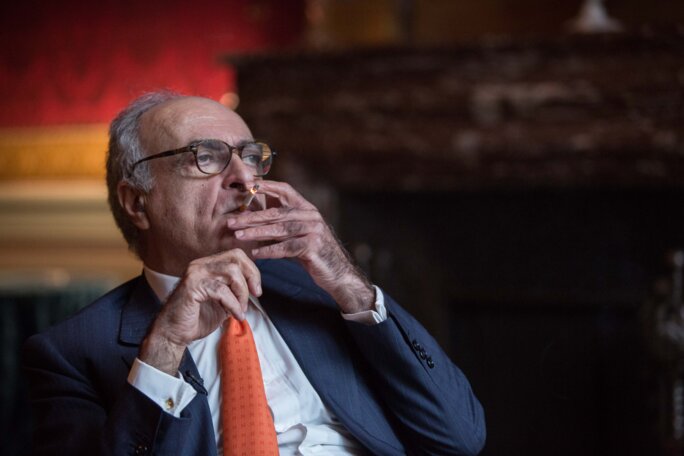A Paris court on Monday sentenced six men, including a former minister and a senior executive of luxury goods group LVMH, to prison sentences of between three and five years for their part in a secret political funding scam 25 years ago and which cost the French state 160 million euros.
The ruling confirmed that the money, which was siphoned off from French weapons sales to Saudi Arabia and Pakistan, was destined to finance the 1995 presidential election campaign of then prime minister Édouard Balladur, who stood – and finally lost – against conservative rival Jacques Chirac.
A complex system of kickbacks was put in place by which sales of two French frigates (and other naval supplies) to Saudi Arabia, and three submarines to Pakistan, by French state-owned military shipbuilder Direction des constructions navales (DCN), now renamed Naval Group, included commissions for intermediaries imposed on the deals by Balladur’s team. The middlemen were to funnel cash from their takings back into the coffers of Balladur’s campaign.
Balladur, now aged 91, and his then defence minister François Léotard, 78, face a separate trial over the scam later this year before a special French court – the Cour de justice de la République – which is reserved for cases of alleged wrongdoing by members of government during their term in office.
Nicolas Sarkozy, France’s former president, at the time served as budget minister under Balladur, his political mentor, and as campaign spokesman during Balladur’s bid for the presidency, and the six sentenced on Monday include several close to both men. Nicolas Bazire, who was Balladur’s campaign director, and chief of staff between 1993-1995, and who is currently managing director of the Groupe Arnault, owner of luxury goods group LVMH, was handed a five-year prison sentence, two of them suspended. Bazire, 62, a close associate of billionaire Bernard Arnault, and who is also a board member of several large French corporations, has been close to Sarkozy since the early 1990s and was best man at the latter’s marriage to Carla Bruni in 2008.

Enlargement : Illustration 1

Renaud Donnedieu de Vabres, 66, a former culture minister and junior minister for European affairs, who at the time of the scam served as an advisor to Léotard, was also handed a five-year prison sentence, two of them suspended.
Thierry Gaubert, 69, an advisor at the time to then budget minister Nicolas Sarkozy, with whom he has close relations going back several decades, was handed four years in prison, two of them suspended.
Dominique Castellan, 82, who headed the international branch of shipbuilder DCN, was given three years in jail, with one of them suspended.
The two others sentenced on Monday were Paris-based French-Lebanese businessman Ziad Takieddine,70, and fellow Lebanese arms broker Abdul-Rahman Al-Assir, 69, the intermediaries in the weapons deals, who were not in court to hear the ruling. They were each handed five years in jail, none supended, and a warrant for their arrests was issued immediately.
Presiding judge Christine Mée said Basire, Donnedieu de Vabres, Guibert and Castellan had contributed to the scam “in full knowledge of the facts” and had allowed the intermediaries, Takieddine and Al-Assir, to “receive very large commissions without economic justification” and to the detriment of the state.
After the verdicts were pronounced, Bazire, Renaud Donnedieu de Vabres and Gaubert, wearing cloth masks due to the Covid-19 virus epidemic and accompanied by their respective lawyers, cut through a crowd of waiting journalists without saying a word.
The trial of the six was the financial chapter of what has become known as the Karachi Affair, so-called because of the killing in the Pakistani port city of Karachi of 14 people, including 11 French engineers from the DCN, on May 8th 2002. The engineers, who died when a car bomb exploded close to their minibus, were working on the building of the Agosta-class submarines sold in one of the deals from which the kickbacks came.
A second, ongoing judicial investigation in France is looking into suspicions that the bombing was a revenge attack for unpaid secret commissions promised to individuals in Pakistan. It is speculated that these were among all the commissions that Jacques Chirac, after his election as president in 1995, ordered to be blocked so as to starve his conservative rival Balladur of any further secret funding.
The illegal political funding at the heart of the trial that ended this week in Paris emerged from the investigations into the Karachi bombing, which were prompted by the campaigning of the families of the murdered DCN engineers, who set in train the judicial events after they filed a formal complaint. But their campaign was initially an arduous process, stalled by the justice system and which met with obstacles like evidence hidden behind documents classified as secret.
The lawyer for the families, Olivier Morice, told the reporters gathered at the law court on Monday that he felt “very great satisfaction” at the verdicts. He underlined that when the families first filed their complaint, chief public prosecutor Jean-Claude Marin had claimed that it was not receivable because of the statute of limitations. “It was said that this affair was an illusion,” he said. “The French people were made fun of. It is truly an affair of state. These are serious convictions of ministerial advisors. What we’re waiting for now is that Messrs Balladur and Léotard appear before the Cour de justice [de la République].”
The verdicts announced on Monday noted that, “the involvement of the network of intermediaries could only have been concretised with the agreement of the Ministry of Defence and Mr Donnedieu de Vabres,” who had “maintained very close links” with Takieddine and as such “allowed the payment of commissions”.
“It is established that Mr Donnedieu de Vabres received funds from Mr Takieddine”, said the presiding judge, who said these were a return gift from Takieddine for having been chosen to take part in the operation. Donnedieu de Vabres was found guilty of complicity in misuse of company assets and of receiving stolen assets.
As for Bazire, Judge Mée said “the involvement of the Takieddine network could only prosper with the support of Mr Nicolas Bazire” – who during the trial had claimed he could not remember the presence of Takieddine at what were identified as crucial meetings for the illegal funding. As director of Balladur’s 1995 election campaign, Bazire, said the judge, was “necessarily kept informed of the situation of the accounts of the candidate’s campaign and the arrival of massive funds, what’s more in cash”.
Similarities with alleged Libyan funding of Sarkozy bid
The magistrates presided by Judge Mée said the court had taken into account the confession of Takieddine “about the delivery of 6 million francs [the then French currency and a sum equivalent to just more than 900,000 euros] to Mr Thierry Gaubert, a sum destined for Mr Bazir to bail out the campaign accounts of Mr Balladur”. Regarding a cash deposit of 10,250,000 francs (more than 1.5 million euros) on April 26th 1995 into the bank account of Balladur’s election campaign support association, “no coherent explanation has been given by the campaign officials [who included Bazire, its director] about this deposit of funds, exceptional by its amount”. The magistrates’ ruling spoke of “outlandish explanations” given by the defendants when they suggested that the cash may have come from the sale of T-shirts and badges at campaign public meetings in support of Balladur.
Concerning Bazire, the magistrates concluded that as “a senior civil servant, chief of staff [for then prime minister Balladur], whose duties demanded an irreproachable probity given the sensitivity of the market of military weapons […] was an attack of exceptional gravity upon public economic order, but also confidence in the functioning of public life”.

Enlargement : Illustration 2

Thierry Gaubert, who served as advisor for the then budget minister Nicolas Sarkozy shortly before joining Balladur’s campaign team, was described by the magistrates as the “indispensable link” for the illicit funding. “He allowed for the return to France in 1995 of kickbacks from commissions from the [Saudi and Pakistani] contracts […] and destined for the campaign accounts of Mr Édouard Balladur,” said the magistrates. “In close relations with Ziad Takieddine, it is demonstrated that he perfectly knew the criminal origin of the funds.”
The magistrates also underlined the closeness of Gaubert with both Nicolas Sarkozy, and also Sarkozy’s then chief of staff, Brice Hortefeux. The latter is a longtime friend, and longserving political lieutenant of Sarkozy who, when president between 2007 and 2012, appointed Hortefeux to several ministerial posts, including that of interior minister. He is also a key figure in the ongoing judicial investigation into suspected illegal funding of Sarkozy’s own presidential election campaign by the late Libyan dictator Muammar Gaddafi. “It has been proven, in view of his [Gaubert’s] relations with Nicolas Bazire and Brice Hortefeux, that he was implicated in Mr Édouard Balladur’s campaign, and not a simple sympathiser as he would have it believed,” the magistrates concluded.
The “Karachi Affair” funding case bares striking similarities with the events, practices and people in that of the alleged Libyan funding, both involving the quartet of Sarkozy, Hortefeux, Takieddine and Gaubert.

Enlargement : Illustration 3

Announcing their verdicts on Monday, the court magistrates set out that Dominique Castellan, head of the international department of shipbuilder DCN, called DCN-I, “deliberately gave his subordinates the task of executing instructions [which were] manifestly contrary to the interests of his company in order to maintain the good relations he had with the Minister of Defence and his cabinet, and to preserve his end [remaing years] of career”. Under his orders, the DCN-I “paid commissions of 190 million francs [29 million euros]” to “a network that was totally of no use”, and “the proof of the reality of the services provided by the Al-Assir-Takieddine network is not provided by any factual or tangible element”.
Takieddine “was perfectly aware of participating in a system of kickbacks on commissions which allowed for the bailing out of the campaign accounts of candidate Balladur, notably after the first round [of the two] of the elections”. The magistrates said Takieddine was “incapable of explaining” the effective services provided by his network in lifting what he had claimed were obstacles – “which he did not detail” – in the weapons sales to Saudi Arabia and to Pakistan. What they called “sophisticated and opaque” financial structures used by Takieddine and Al-Assir demonstrated “his awareness of the absence of an economic justification of these commissions, and characterise a will to dissimulate”.
While El Assir and Takieddine served to transfer funds from the weapons deals for political use, the magistrates noted, it was their “personal enrichment” that was the motive, whereas “these military contracts directly touched the interests of the state”.
Takieddine was found guilty of misusing company assets and fraud, and also of tax fraud and laundering the proceeds of tax fraud for having hidden numerous properties in France and elsewhere in Europe from the French tax authorities. The court ordered the confiscation of his luxury Paris apartment on the avenue Georges Mandel, and other property at Cap d’Antibes on the French Riviera, as well as his yacht, La Diva, and two Jaguar cars.
Meanwhile, during the trial, the Naval Group (the renamed DCN), which was a civil party to the case, had adopted a position defending the former ministerial aides among the defendants, arguing that the payment of commissions to intermediaries was justified. Its legal team had asked the court to drop the charges against the four men for misuse of company funds while maintaining the same charge against Takieddine.
The magistrates dismissed that request, while the public prosecution services described the company’s approach as “coming to the rescue of powerful defendants”.
Olivier Morice, lawyer for the families of the engineers killed in Karachi in 2002, on Monday added: “We denounce the manner in which the DCN-I protected the protagonists. DCN-I did not ask for any damages award. It is unheard-of and scandalous. One day it will have to be called to account.”
-------------------------
- The French version of this report can be found here.
English version by Graham Tearse


